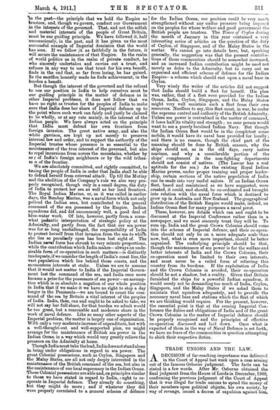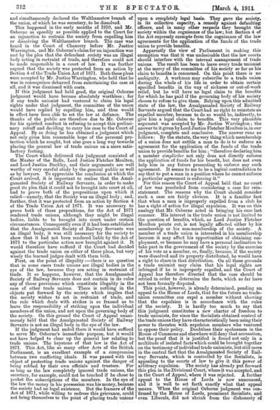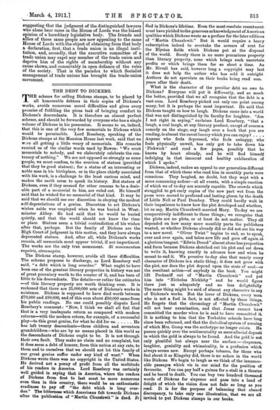TRADE UNIONS AND THE LAW.
A DECISION of far-reaching importance was delivered r‘ in the Court of Appeal last week upon a case arising out of the famous Osborne judgment. The facts can be stated in a few words. After Mr. Osborne obtained the final judgment from the House of Lords in December, 1909, confirming the previous judgment of the Court of Appeal that it was illegal for trade unions to spend the money of their members upon political objects, his own society, by way of revenge, issued a decree of expulsion against him, and simultaneously declared the Walthamstow branch of the union, of which he was secretary, to be dissolved. This happened in the early months of 1910, and Mr. Osborne as speedily as possible applied to the Court for an injunction to restrain the society from expelling him or dissolving the Walthamstow branch. The case was heard in the Court of Chancery before Mr. Justice Warrington, and Mr. Osborne's claim for an injunction was met by the plea that the defendant society was an illegal body acting in reetraint of trade, and therefore could not be made responsible in a court of law. It was further argued that the society was protected from an action by Section 4 of the Trade Union Act of 1871. Both these pleas were accepted by Mr. Justice Warrington, who held that he was in consequence debarred from entertaining the case at all, and it was dismissed with costs.
If this judgment had held good, the original Osborne judgment would have become absolutely worthless; for if any trade unionist had ventured to claim his legal rights under that judgment, the committee of the union would have replied by expelling him, and thus would in effect have been able to set the law at defiance. The thanks of the public are therefore due to Mr. Osborne for his spirited conduct in refusing to accept this prelimi- nary rebuff and deciding to carry his case to the Court of Appeal. By so doing he has obtained a judgment which not only gives him reasonable hope of the personal pro- tection which he sought, but also goes a long way towards placing the general law of trade unions on a more satis- factory footing. The Court which delivered this judgment consisted of the Master of the Rolls, Lord Justice Fletcher Moulton, and Lord Justice Buckley, and their arguments are well worthy of very careful study by the general public as well as by lawyers. To appreciate the conclusion at which the -Court arrived, it is important to realise that the Amal- gamated Society of Railway Servants, in order to make good its plea that it could not be brought into court at all, had to prove both of the propositions upon which it relied—namely, that the Society was an illegal body ; and, further, that it was protected from an action by Section 4 of the Trade Union Act of 1871. It was necessary to prove both of these propositions, for the Act of 1871 rendered trade unions, although they might be illegal bodies, liable to be brought into court under certain circumstances. Consequently even if it had been established that the Amalgamated Society of Railway Servants was an illegal body, it was still necessary for the society to show that it had not been rendered liable by the Act of 1871 to the particular action now brought against it. It would therefore have sufficed if the Court had decided against the trade union on either of these pleas, but very wisely the learned judges dealt with them both. First, on the point of illegality :—there is no question that in some cases trade unions are illegal bodies in the eye of the law, because they are acting in restraint of trade. It so happens, however, that the Amalgamated Society of Railway Servants does not contain in its rules any of those provisions which constitute illegality in the case of other trade unions. There is nothing in the objects put forward by the society which implies that the society wishes to act in restraint of trade, and the rule which deals with strikes is so framed as to leave the responsibility of striking upon the individual members of the union, and not upon the governing body of the society. On this ground the Court of Appeal unani- mously held that the Amalgamated Society of Railway Servants is not an illegal body in the eye of the law. If the judgment had ended there it would have sufficed to serve Mr. Osborne's immediate purpose, but it would not have helped to clear up the general law relating to trade unions. The keystone of that law is the Act of 1871. This Act, like so many other Acts of the British Parliament, is an excellent example of a compromise between two conflicting ideals. It was passed with the object of protecting trade unions against the danger of being robbed by their own officials and trustees. For as long as the law completely ignored trade unions, the secretary, for example, could not be touched if he chose to pocket the subscriptions of the members. In the eye of the law the money in his possession was his money, because the society had no legal existence. Thit the framers of the Act of 1871, while willing to redress this grievance, could not bring themselves to the point of placing trade -unions- upon a completely legal basis. They gave the society, in its collective capacity, a remedy against defaulting officers, and in many other respects they brought the society within the cognisance of the law; but Section 4 of the Act expressly exempts from the cognisance of the law agreements for the application of the funds of the trade union to provide benefits. Apparently the view of Parliament in making this exemption was that it was undesirable that the law courts should interfere with the internal management of trade unions. The result has been to leave every trade unionist at the mercy of the committee of his society so far as his claim to benefits is concerned. On this point there is no ambiguity. A workman may subscribe to a trade union during the whole of his life in order to obtain certain specified benefits in the way of sickness or out-of-work relief, but he will have no legal claim to the benefits for which he has paid if the governing body of his society choose to refuse to give them. Relying upon this admitted state of the law, the Amalgamated Society of Railway Servants argued that the Court had no right to reinstate an expelled member, because to do so would be, indirectly, to give him a legal claim to benefits. This very plausible argument was accepted by Mr. Justice Warrington ; the answer to it given by Lord Justice Fletcher Moulton is, in our judgment, complete and conclusive. The answer runs as follows : By the statute, the very thing which membership of a union does not entitle a man to do is to enforce an agreement for the application of the funds of the trade union to provide benefits for him ; "therefore declaring him a member simpliciter not only does not directly enforce the application of funds for his benefit, but does not even help him in any future proceeding to enforce any such agreement. It seems to me to be a logical contradiction to say that to put a man in a position where he cannot enforce a particular agreement is enforcing it."
For this reason the Court of Appeal held that no court of law was precluded from considering a case for rein- statement. The reasons why the Court should consider such a case are fairly obvious. It is a familiar fact that when a man is improperly expelled from a club he has a right of action for illegal expulsion. It was on this analogy that Mr. Osborne acted in bringing his case last summer. His interest in the trade union is not limited to the question of benefits, which, as Lord Justice Fletcher Moulton points out, is not legally affected either by his membership or his non-membership of the society. A. member of a trade union is interested in his membership because it may affect his opportunities of obtaining em- ployment, or because he may have a personal inclination to take part in the government of the society by the exercise of his vote as a member, or, finally, because, if the society were dissolved and its property distributed, he would have a right to share in that distribution. On all these grounds a trade unionist may claim that his legal rights are infringed if he is improperly expelled, and the Court of Appeal has therefore directed that the case should be retried in order to determine the facts, which so far have not been formally disputed.
This point, however, is already determined, pending an appeal to the House of Lords, that for the future no trade- union committee can expel a member without showing that the expulsion is in accordance with the rules of the society. It is hardly too much to say that this judgment constitutes a new charter of freedom to trade unionists, for since the Socialists obtained control of the trade unions they have characteristically been using their power to threaten with expulsion members who ventured to oppose their policy. Doubtless their spokesmen in the House of Commons and elsewhere will deny that accusation, but the proof that it is justified is found not only in a multitude of isolated factsrwhich could be brought together on the testimony of individual trade unionists, but still more in the central fact that the Amalgamated Society of Rail- way Servants, which is controlled by the Socialists, is appealing to the courts of law to give it this power of arbitrary expulsion. The society has already put forward this plea in the Divisional Court, where it was accepted, and , in the Court of Appeal, where it was rejected. A further appeal to the House of Lords is now announced, and it is well to set forth exactly what that appeal means. When the original 'Osborne judgment was con- firmed by the House of Lords, prominent Socialists, and even Liberate, did not 'shrink from the - dishonesty of suggesting that the judgment of the distinguished lawyers who alone hear cases in the House of Lords was the biased opinion of a hereditary legislative body. The friends and allies of these same people are now appealing to the same House of Lords with the object of obtaining from that body a declaration, first, that a trade union is an illegal insti- tution, and, secondly, that the executive committee of a trade union may expel any member of the trade union and deprive him of the rights of membership without any cause shown, and conceivably in open defiance of the rules of the society. That is the paradox to which Socialist management of trade unions has brought the trade-union movement.












































 Previous page
Previous page